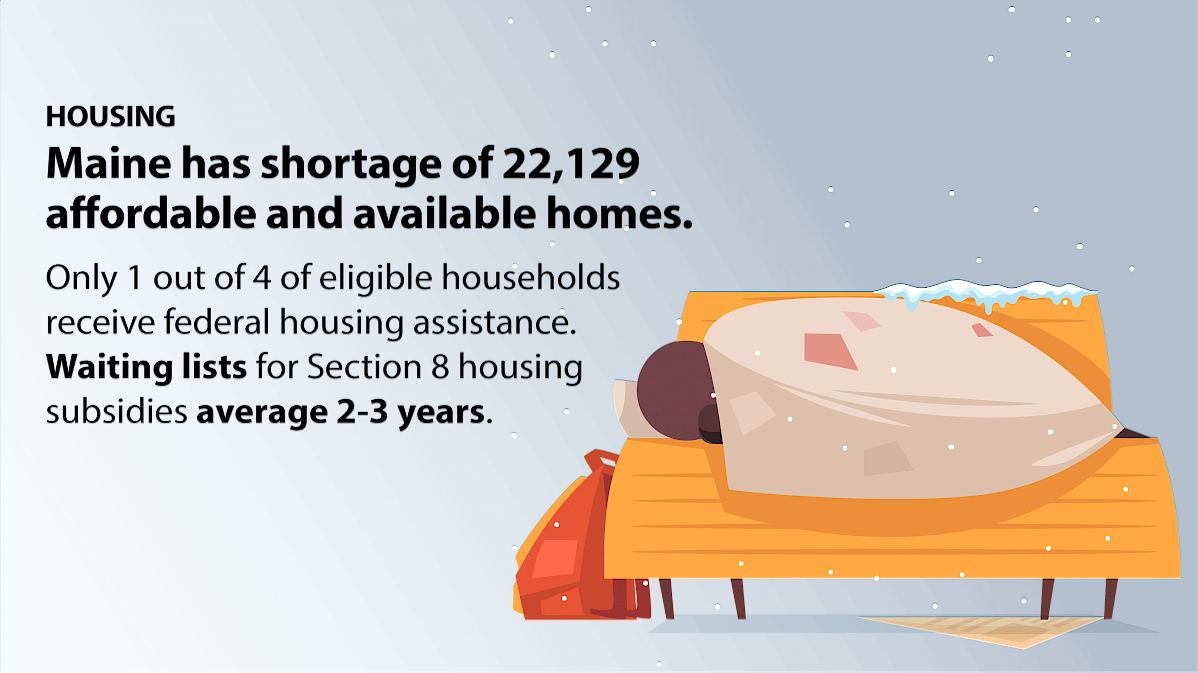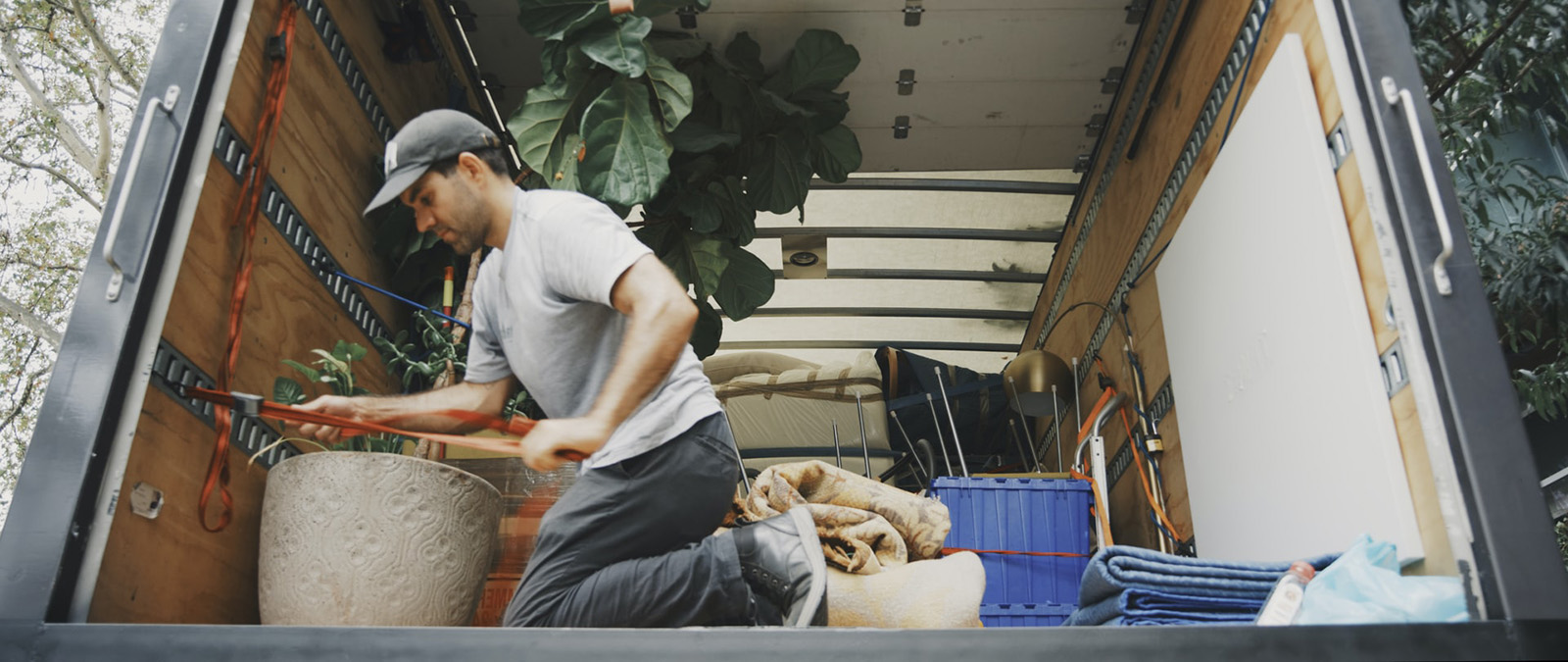Housing
The home is the primary site of healthcare. Healthy housing can promote safety and recovery, whereas a lack of housing or unhealthy housing can cause illness, disability, and even death.
We must ensure all Mainers are fairly, affordably, and adequately housed throughout the recovery period and permanently in the future so that our state is more healthy and resilient in the face of economic, social, and medical hardship.

This begins with establishing safe, energy efficient housing as a human right and entitlement that the state has a responsibility to guarantee for every person. Inclusive and affordable housing must be available in every community according to need. We must end all forms of racial segregation and discrimination in housing, including those private and government practices that result in disparate impact. We must also address the disparate impact of housing instability and homelessness on LGBTQIA+ people of color. And we must prioritize housing and supportive services for people with disabilities in the community, with self-determination at the forefront, so that people with disabilities are not forced into institutional settings. Furthermore, because the housing stock in Maine is the oldest in the country and the cost of fuel is high, we must expand weatherization and energy efficiency programs and requirements for property owners to reduce the energy burden for vulnerable Mainers.
To ensure affordability, Maine needs a fully funded state housing assistance program that mirrors the federal housing choice voucher program, which provides temporary assistance to all eligible applicants on housing authority waiting lists in Maine for either public housing or housing choice vouchers. This program should also include those households that are typically ineligible for the federal housing choice voucher for reasons other than income, such as immigration status or conviction record. Discriminatory industry practices against low-income renters and people who use drugs and their loved ones must be prohibited, and exclusionary government policy that prevents the development of new affordable housing in middle and high-income communities must be repealed. Instead, state and federal programs should foster and encourage development of affordable housing across Maine’s communities. To further promote inclusion, the board of every housing authority and nonprofit housing corporation in Maine should maintain a minimum proportion of 1/3 directors that are either low-income tenants and/or people from protected classes under federal Fair Housing law and Maine Human Rights law, and must enact a diversity, equity, and inclusion plan that continually assesses and improves the organization's leadership, protocols, and practice outcomes. To reduce displacement, tenant rights and protections must be strengthened to include rent stabilization, an eviction diversion program, tenant opportunity to purchase policies and laws, and an end to no-cause evictions.

Additionally, ending homelessness must be a paramount priority for our state. The production and maintenance of supportive housing, affordable housing coupled with supportive services, is needed to offer long-term housing stability and an exit for persons in our emergency shelter system. Investments in supportive housing (service enriched affordable housing) save money because this type of intervention stabilizes the very people who ricochet through our most expensive emergency systems; when people are stabilized with housing and adequate support, they stop experiencing homelessness and other emergencies. Affordable housing must be commensurate with need and welcome people who experience homelessness; currently, people in all parts of the state are languishing in homelessness because they cannot find housing.
Finally, to create a truly equitable housing system, Maine needs to produce permanent housing over the next 10 years on a scale that fully meets the state’s needs, built using universal design as well as design practices that promote ecological sustainability and low operating costs. This will require substantial capital investments in different types of housing organizations whose primary mission is to operate safe, healthy, and affordable housing for the common good, including public housing, community-based nonprofits, supportive housing, cooperatives, and land trusts.
What you can do …
Housing Justice Maine believes housing is a human right and seeks to empower those residents most deeply impacted by an oppressive housing system: black, indigenous, people of color, low-income, homeless, immigrant, living with disability, queer and trans, and/or formerly incarcerated.
We recognize the way in which land and housing have been used as tools of social segregation, wealth extraction, and wealth hoarding throughout Maine’s history, and that those practices have deep roots in our current culture and economy. Therefore, we require deep and comprehensive policy changes to create a truly just housing system for all.
We support a policy strategy that fully funds housing assistance for all low-income people in Maine, protects all tenants from discrimination and unjust evictions, and subsidizes the creation of thousands of permanently affordable and supportive housing units every year, so that no person in Maine is ever left to spend even one night without safe shelter ever again. Our policy strategy includes the active involvement of residents in deciding the future of their housing, and the full inclusion of affordable housing options in every Maine community, so that we may increase housing options for those who need it most.
Housing Justice Maine is a coalition of social justice organizations that includes the Maine Immigrant Housing Coalition, Maine People’s Housing Coalition, Maine People’s Alliance, Presente! Maine, Raise-Op Housing Cooperative, Southern Maine Workers’ Center, and Maine Equal Justice. Please contact Rachel Ackoff at rachel@mainepeoplesalliance.org to learn more about our work or check out our policy agenda for 2021.
